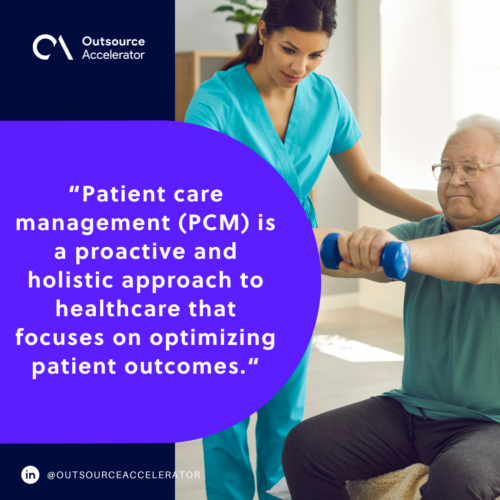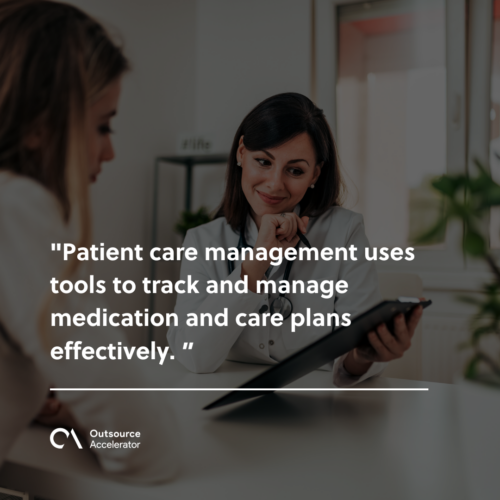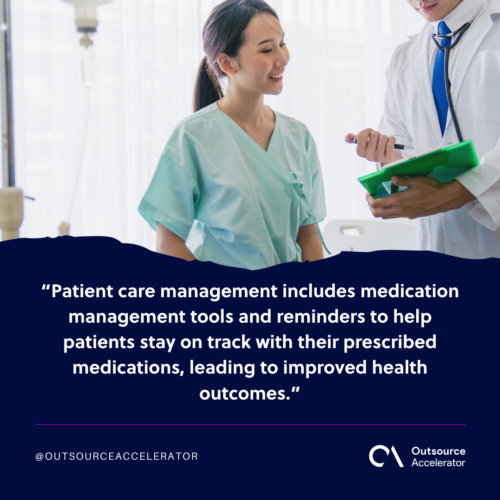What is patient care management?

The shift toward consumer-driven healthcare models has shown the significance of patient-healthcare-provider interactions.
Silverline revealed that 82% of patients say quality customer service is the most important factor when choosing care.
A way to provide quality healthcare is through patient care management.
This article explores its importance, key elements, benefits, and challenges. We’ll also delve into what the future of patient care management will look like.
Patient care management defined
Patient care management (PCM) is a proactive and holistic approach to healthcare that focuses on optimizing patient outcomes. It involves a dedicated care team working collaboratively to ensure patients receive the right care at the right time.
The approach requires effective communication, data analysis, and the integration of various resources to improve patient experiences. Offshore MVP can help you build a team to take care of these.
PCM is rooted in the belief that well-managed care leads to better health outcomes and patient satisfaction.

Importance of patient care management
Patient care management plays a vital role in delivering high-quality healthcare services. It promotes a patient-centered approach, putting the individual’s needs and preferences at the forefront of care.
PCM helps healthcare professionals establish trust and build strong relationships with their patients. It fosters a sense of partnership in the healthcare journey.
It also enhances care continuity, ensuring patients receive proper care in the correct phase. It minimizes gaps in their healthcare journey and improves overall health outcomes.
Key elements of patient care management
Several key elements make up the successful implementation of patient care management:
Dedicated care team
A multidisciplinary team works collaboratively to coordinate care and ensure continuity. This team normally consists of physicians, nurses, social workers, and other healthcare professionals.
Data-centric care plan
Patient data is analyzed to create individualized care plans. This data could include one’s medical history, current treatments, and lifestyle information.
A data-centric approach helps healthcare professionals make informed decisions.
Medication and care management tools
Patient care management uses tools to track and manage medication and care plans effectively.
Some tools that aid in PCM include electronic health records (EHRs), medication adherence apps, and telemedicine solutions.

Hospital-to-home program
A seamless transition from hospital to home is crucial for effective patient care management.
Ensuring proper communication and patient education during discharge can reduce readmission rates and increase patient satisfaction.
Patient education resources
Providing patients with educational materials and resources empowers them to actively participate in their healthcare. This leads to improved self-management and adherence to treatment plans.
Patient-physician communication
Effective communication between patients and physicians guarantees patients understand their medical condition and treatment options.
Additionally, it ensures patients are actively involved in shared decision-making.
Care coordination
Coordinating care across different healthcare providers and settings prevents duplication of tests. It reduces medical errors and ensures seamless transitions between healthcare episodes.
Community resources
PCM should consider community resources to address patients’ social needs and facilitate holistic care. Examples of these resources are social services, support groups, and community health centers.
Decision support
Healthcare professionals can benefit from decision support tools to optimize treatment plans and improve patient outcomes. Some of these tools could be clinical guidelines and evidence-based medicine.
Performance measurement
Regular measuring and monitoring of key performance indicators (KPIs) are vital in PCM. It enables healthcare organizations to evaluate and improve their processes continually.
Benefits of patient care management
Patient care management offers a myriad of benefits:
Improved patient satisfaction
PCM ensures personalized care, coordination, and timely interventions.
Higher patient satisfaction leads to improved health outcomes and increased loyalty, ultimately enhancing the overall healthcare experience.
Enhanced chronic disease management
Patient care management provides continuous monitoring, medication management, and lifestyle guidance tailored to each patient’s unique needs.
This results in better control of chronic conditions and improved quality of life.
Reduced hospital readmissions
Hospital readmissions can be costly and stressful for both patients and healthcare systems.
PCM focuses on preventing complications and ensuring a smooth transition from the hospital to home. This proactive approach significantly reduces the need for readmissions and relapses.
Better medication adherence
Medication adherence is critical in managing chronic conditions and preventing acute health crises.
Patient care management includes medication management tools and reminders to help patients stay on track with their prescribed medications, leading to improved health outcomes.

Lower healthcare costs
Effective patient care management can reduce healthcare costs. It helps prevent complications, hospitalizations, and unnecessary emergency room visits.
Streamlined care coordination
PCM eases communication between healthcare providers, resulting in efficient care coordination, reduced duplication of services, and improved patient safety.
This ensures patients receive the right care from the appropriate providers at the right time.
Future of patient care management in healthcare
The future of patient care management looks promising as advancements in technology and healthcare systems continue to evolve.
The integration of artificial intelligence (AI) and machine learning can help streamline care coordination, personalize treatment plans, and improve clinical decision-making.
Telemedicine and remote patient monitoring will further enhance patient access to care and support the ongoing management of chronic conditions.
Moreover, patient-centric care models are expected to gain prominence, further elevating patient experiences and outcomes.







 Independent
Independent




